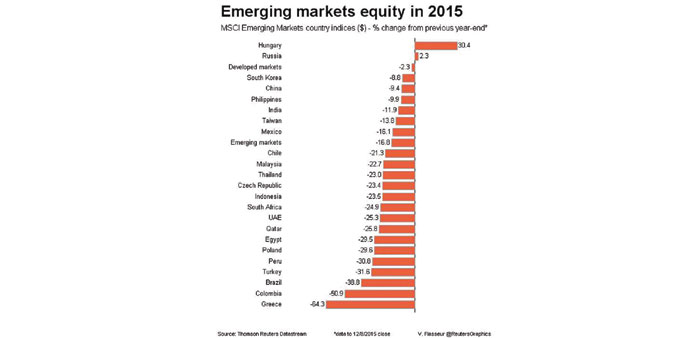Reuters
London
Emerging equities slipped to fresh two-month lows yesterday, as weak Chinese inflation data exacerbated the bearish mood, though an oil price bounce gave a bit of relief to commodity exporters’ currencies and bonds.
Emerging assets have been under pressure since the middle of last week after the European Central Bank’s stimulus measures disappointed, and strong US jobs data cemented expectations for a US interest rate rise next week.
Weak Chinese data and commodity prices added to the selling pressure this week, with the benchmark emerging equity index down 0.4% yesterday, extending its losing streak into a sixth day.
“The valuations in equity markets are in many places quite extreme,” said Antti Raappana, a portfolio manager at Danske Capital. “There’s a lot of pessimism around.”
Chinese mainland stocks edged up 0.4% as traders bet on more policy stimulus following mixed inflation data. Consumer price inflation picked up slightly in November, but remained well below the government’s 2015 target, whilst producer prices continued to tumble.
This raised expectations that the government would have to do more to stave off a downward spiral. The yuan slid to its weakest against the dollar since mid-August after the People’s Bank of China set its daily guidance rate at a four year low.
Raappana said he was expecting a moderate depreciation of the yuan in 2016 as he thought the Chinese authorities would find it difficult to restrict capital outflows now the International Monetary Fund (IMF) has said the yuan will be included in its special drawing rights basket.
Ukraine and Russia remained at loggerheads after the IMF said it would change its lending rules to allow it to keep supporting countries if they fail to repay official creditors. This would help Ukraine if it misses payments on a $3bn debt to Russia.
“The IMF’s move should make it easier for Ukraine to receive future IMF disbursements, although focus recently has turned to Ukraine’s 2016 budget; the failure to approve a new tax code, for example, has delayed the latest IMF tranche,” analysts at BNP Paribas said in a note.
Ukraine’s restructured bonds weakened sharply on Tuesday amid general emerging market weakness but also fears that the reform process was faltering.
The rouble firmed 0.3% against the dollar and Moscow shares were up 0.5% after oil prices rose around 50 cents.
The South African rand also inched off a record low and stocks rose 0.5%.
Eurobonds from commodity exporting African countries rose around half a cent after hitting record or multi-month lows on Tuesday.
In the Gulf however, Qatari stocks fell almost 3% to new two-year lows and Dubai lost another 1% . The Saudi bourse managed to rise 0.6% off three-week lows.

